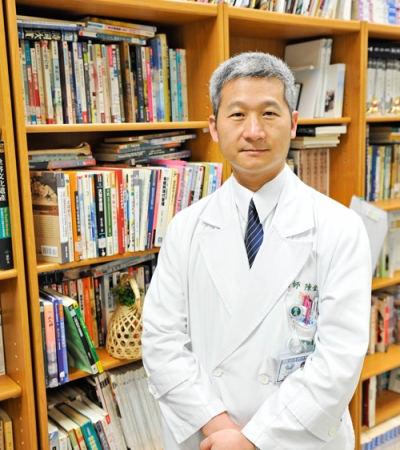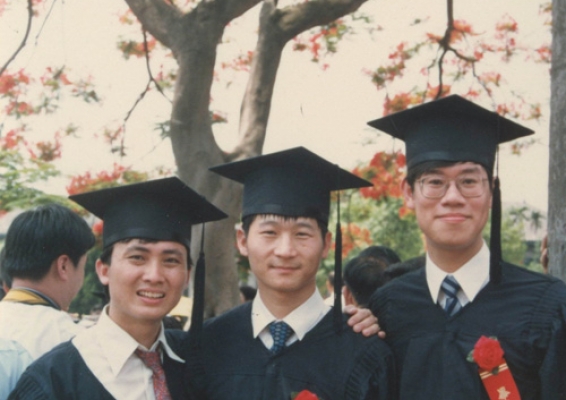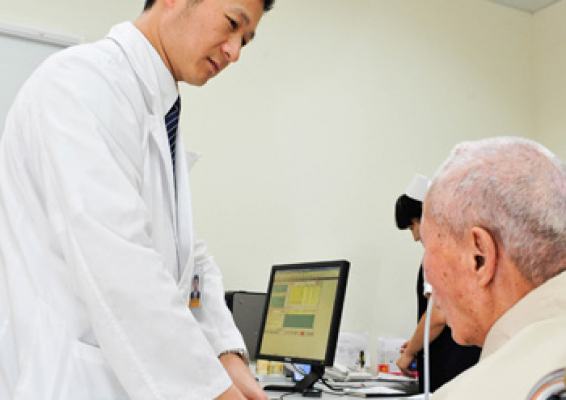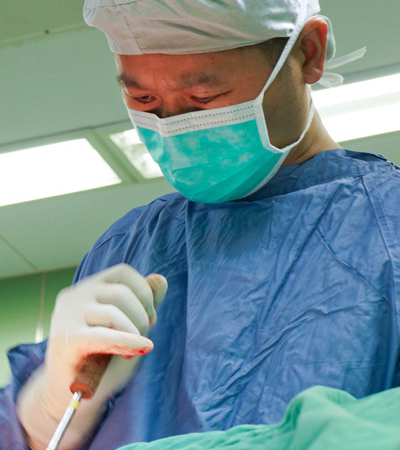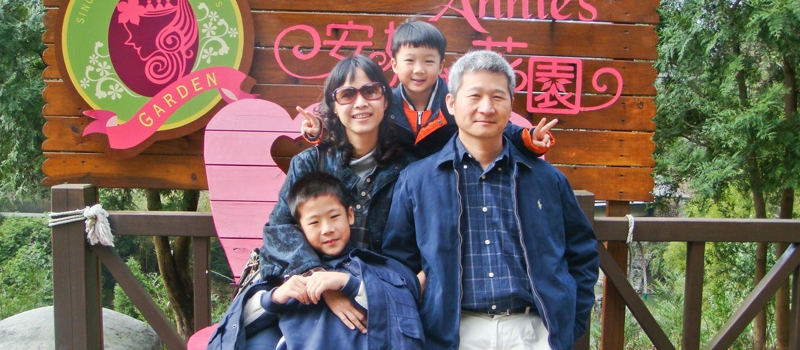Written by Jin-Cherng Chen, Director of Dept. of Neurosurgery & Vice Supt. of Dalin Tzu Chi Hospital.
When we were young, no matter how tough life was, it all seemed so natural, leaving only the happy times and not the sorrows or bitterness. My unpretentious, direct and go-with-the-flow personality was forged by my childhood experiences, and it is still the same to this very day
As far as I can recall, we were always on the move, since my parents couldn’t afford rents. Sometimes, we move only from one house to a neighboring one. We were most afraid of those heavy downpours, when the rain poured in from the broken roof; sometimes there were mudslide, leaving a house full of mud. It was not till years alter that I realized those houses we used to live in were built high in the front and low at the back, and usually located at foothills, no wonder they always flood after a heavy downpour. Plus, the houses we rented were fairly crude, made from tiles and cement pastes, sometimes we would find snakes inside.
Because of poverty, my brothers and sisters started working right after they finish elementary school, either operating lathe or working as house maids, in order to support our family. I never really insisted to continue my study, yet my father never stopped me either. Aside from the few times borrowing money from relatives for school fees and stationery, I could count with one hand the amount of times I paid school fees, from elementary all the way to high school. Every time when the school opens and teachers ask for school fee, I would vanish on purpose for a few days before attending classes again. Sometimes I would vanish for an entire month. When I reappear, I would receive several beatings and punishments. The teacher would ask me if I brought my school fee. I did not recall whether I paid it or not. Only later did I know that my sisters did the same.
photo1: Jin-Cherng Chen, born into poverty, was admitted to the College of Medicine, National Taiwan University, together with classmates who share the same ideal.
photo2: Vice Superintendent Jin-Cherng Chen, who survived the shortage of staff when the hospital was founded, is still occupied by administrative work, medical practice and education, yet always places his patients need above all else.
Somehow, I managed to find my way into National Chiayi Senior High School, a school known reputable for the amount of students they sent to medical schools. I went with the flow, just as always. Under the guidance of my teachers, I was admitted in 1984 to the School of Medicine, National Taiwan University, beginning my life as a college student. It was quite unbelievable.
I spent the first two years on the main campus, occupied by general curriculum that did not have much to do with medicine. I even doubted whether I was in the right college. In my third year, the courses began to focus on anatomy, biology, pharmacology and pathology, the amount of homework also increased exponentially. I came in contact with real patients in the bottom half of my fourth year, focusing on clinical diagnostics.
In my fifth and sixth year, I began interning in various departments; seventh year was when I truly entered clinical practice. I was so thrilled, finally having a chance to assist doctors to care for their patients while comprehending the characteristics of each departments. Ultimately I chose surgical department as my life long vocation, since the result is fairly instantaneous, a perfect match for my straightforwardness. Furthermore, many of my close friends who share the same ideal also chose surgery.
A skilled brain surgeon, Vice Supt. Jin-Cherng Chen is always solemn when operating, never showing any sign of fatigue despite the prolonged surgeries. He earned the title “Ironman” because of his incredible feat.
I spent my residency, as I recall, amid endless criticism by my seniors and by the nurses, “What is wrong with you? Can’t even get the basics right!” From central venous catheters to respiratory intubation, I could never avoid criticisms no matter how skillful I became. Years of setback and frustrations allowed me to fully comprehend the necessity of those complicated and cumbersome procedures prior to a surgery. It was for the good of the patient!
After graduation, I was supposed to work in Tainan with the recommendation from my mentor. Considering my intent to serve my hometown, I decided to work at Dalin Tzu Chi Hospital.
When the hospital inaugurated, I had to attend to the patients from ER who required emergency operations in addition to my outpatients. I was often interrupted in the middle of a session because of emergency operations. I spent most of my time running between the outpatient clinic and the operation room. Sometimes when two brain trauma patients arrive simultaneously, we had to choose the more severe one to operate first.
Not only did I had to face outpatients and emergency patients, I had two dozen more in the ward I had to attend to, leaving me with very little time to write medical records, which then gradually piled up in dozens. Sometimes I had to settle medical disputes as well.
In addition to emergency at ER, whenever a patient in the ICU has problems, the ward would call the attending physician. Most of the days, my beepers would beep practically all night long, so I had to, in the middle of the night, wake up physically and mentally. I remember a drunk family member who’s child was in the ICU due to head trauma, pressing the door bell constantly outside the ICU asking nurses to explain her child’s situation. The nurses, who couldn’t handle the family member, called me for help. I rushed to the ICU, explained in detail the child’s condition. He, although drunk still, was satisfied enough to go home and rest.
With the empathy and support from his wife, Vice Supt. Jin-Cherng Chen is able to dedicate his time to refining his treatment plans while maintaining a healthy marriage and family relationship.
Although I didn’t sleep much at night, I had to take care of my new born child once I was home. Even during a rare occasion where I could spend some time dining with my family, I would be called back to the hospital right after our orders were placed. Since I could not leave the hospital for too long, it became my home away from home. The amount of time I could spend with my family drastically reduced. When my second child was born, I was so occupied with outpatients and surgeries that I could not be by her side. She was the one who ran the house. During those early years, she had to go home alone during new years since I was tied up at work, and yet she never complained once.
I earned the title “Ironman” by operating long hours of surgeries, from dusk till dawn. Even with these experiences, though, each encounter is different. It is crucial to acquire yet more experience and practice to be able to see satisfying recovery from patients. Never cease to read a variety of surgical literature, visit websites and ask experts in order to further perfect your surgical skills.
There had been patients who praised my skills as godlike. I do not need any praise. As long as my patients recover, I have all the rewards I will ever need, as it signifies that my endeavors are fruitful. Making treatment plans in accordance to the patients’ conditions and watch them recover is the greatest recognition for any doctor, enough to drive them forward and achieve even better results.
“Work with diligence! Do what needs to be done and to the best of your ability.” This is my motto in life, simple and straightforward; it is the best reward I will ever have.

